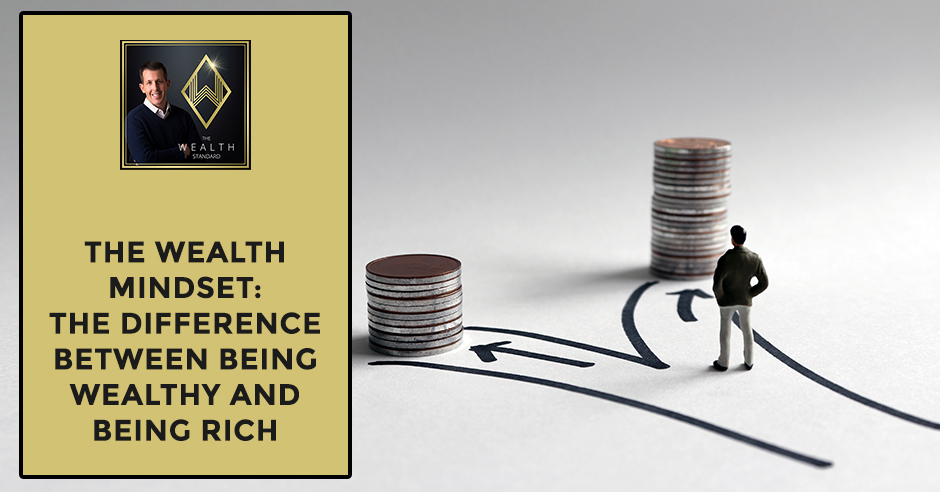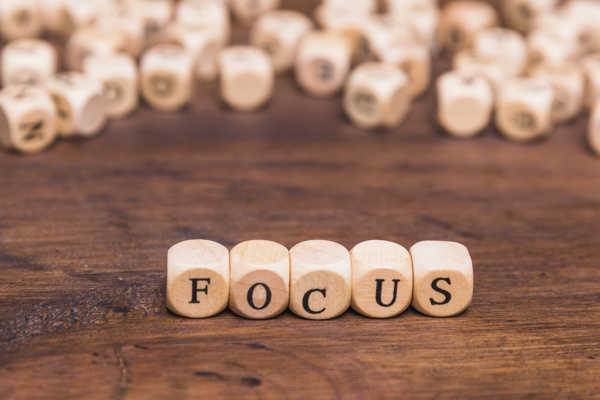A Fulfilling Life Will Never Come From Achieving Goals With Tim Reynolds
Podcast: Play in new window | Download
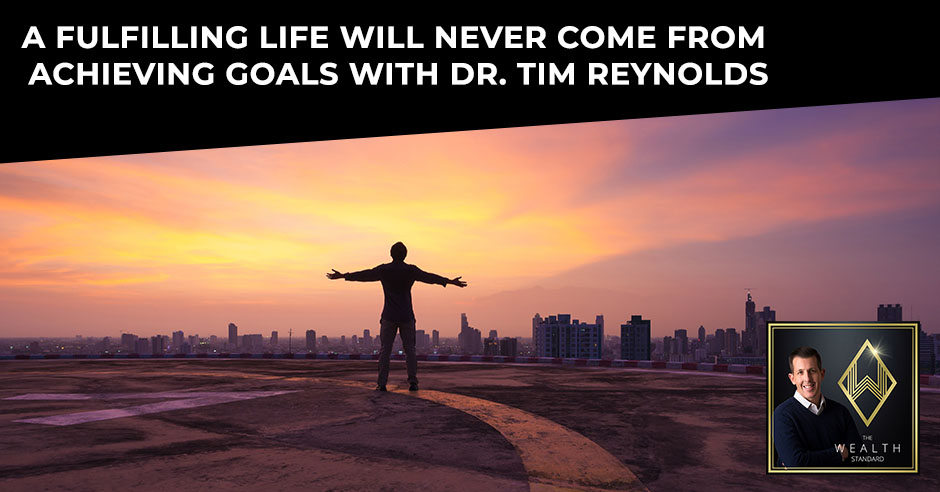
What are the things you need to do to live a fulfilling life? Does it come from achieving goals? Dr. Tim Reynolds, author and creator of Living Every Minute, doesn’t think that’s always the case, and in this interview with host Patrick Donohoe, we learn where fulfillment comes from. We listen to Tim’s recollections about family and a story about a medical emergency he had worked on that showed him why the goal isn’t all there is, and that sometimes, the journey is just as important. Be inspired by Tim’s words and be ready to live a greater life.
—
Watch the episode here:
Listen to the podcast here:
A Fulfilling Life Will Never Come From Achieving Goals With Tim Reynolds
The following five episodes are with businessman, investor, doctor, and now author, Tim Reynolds. The interview was in-person in my office. If you’re reading the episodes and want to watch the videos, just go head over to TheWealthStandard.com, and it’ll have a link there. When the five segments are complete, we’re going to post the entire interview on our YouTube channel. Make sure you check that out.
A little bit about Tim. He is a former Green Beret in the Special Forces. He was a medic and also a battalion surgeon. He graduated from Texas A&M with his Medical degree and his specialization was Emergency Medicine. He was an emergency room doctor for several years, and then co-started a company called HealthCARE Express.
He has 15 or 16 locations throughout Texas, Oklahoma, Arkansas, and Louisiana. He has his book. You can check it out on Amazon. It’s called Living Every Minute. It’s also on Audible. He reads the Audible audio book. Tim is an amazing guy. He is one of the first original platinum partners with Tony Robbins. He has love and zest for life. It’s throughout his book. It’s going to be throughout this interview.
You can imagine that in the roles that he’s played, he has experienced firsthand the fragility of life. He’s going to share some of those experiences throughout these five segments. I want to forewarn you. This is a PG thirteen-ish interview. There’s some colorful language. There are also some relatively graphic stories that Tim tells, but you are going to experience him, his heart, and his passion for life. You can check his website out. It’s LivingEveryMinute.com. He has some personal development programs, courses, and a lot of other resources that you want to check out. Go head over there. Without further delay, let’s start episode one with my dear friend, Tim Reynolds.
—
If you took the pillar of relationships in the book, we talked about the 30-second make-out session. I’ll give this as an example. I invented this thing called the 30-second make-out session. It’s a crazy, simple idea. If you’re the guy, you walk into your wife, she’s in the kitchen, or she’s at work, even better. Wherever you find her, you throw her up against the wall, make out, hair grab, and whatever it is that she likes like two rowdy kids. If you’ve been married for a long time, that doesn’t happen very often. What if you did that for 30 seconds and then you walk away? Don’t say a damn word, especially if you don’t tell her that you’ve read the book. You walk away.
What if she slaps you?
She would be like, “Wait.” I’ll grab her harder. She’d be like, “Wow.” It would make her all day. It would be like, she’d want more maybe, but you don’t give it to her and make her beg for it. You would walk away. What if you did that? It’s 30 seconds. For reasons we don’t, we create all these rules about why I wouldn’t do, she shouldn’t do. Fuck all that. Go do it.
If you did that once a day, it would change your entire marriage. That one thing. What I tried to do in the book is not just good philosophy. You go do this. I have five kids. They’ve very successful, great and wonderful. They’re not kids anymore. They’re all adults. Three doctors, one got a business degree, the other one got a brand-new degree. They’ll all come back to work in our companies.
We want the world better for our offspring than it was for us. We want to leave a better place. Click To TweetPeople say, “How are your kids so successful?” I said, “We were blessed.” Obviously, we don’t take credit for all of it. Second thing is, every week, I interview them. They remember this. I would sit in my office and they would have to come in and they’d have to have an interview with Dad. I might’ve sat on the other side of the desk.
It was like a formal interview. “How’s school? How are your friends? What are you doing with so-and-so? What are you thinking about football next year?” We have this interview. I don’t know why I started doing it. I don’t remember. They still say, “I wish we still did those interviews. I love that time.” That’s in the book. Why wouldn’t you do that? Do that. That’s not hard. It’s very simple. They treasure that time. That’s what I’ll do.
Drive up the presence.
Knowing that dad was there. Now that they’re adults, they still want me to do it. I’ll give you one more example. You’ve read this, about the family mission statement. We do what we call the Reynolds family retreats. Once a year, we go somewhere. We went to South Africa. It’s been as simple as going to up to lake camping and it doesn’t have to be expensive. In fact, it was. We were reading a book called The Traveler’s Gift. The book has an adult version and the kids’ version. The kids read the kid’s version, the adults read the adult version.
We’d sit around the table and I’d talk about the book. “What did you learn about it? What did you think about this?” I said, “What do you think our families should be about? What’s our family going to be about? What are our rules?” All the kids would comment. We’d write all these notes about what would make us feel special in our house. We wrote all of these things down. My daughter, Natalie, who’s now an emergency physician, took that. She was twelve at the time. She created a paragraph and we labeled it, The Reynolds Family Mission Statement. We blew it up, framed it, painted in our kitchen.
Every week when we’d have a family night and a game night, we’d stand up and we’d do like this pledge of allegiance, put our hands over our hearts. We would read the family mission statement. The kids are all 12 to 5, 9 to 14 at that time. They are now adults. Every one of my kids carries a laminated card of our family mission statement. That’s the power. Easy to do, easy not to do. That’s the difference between intentionally creating a life that’s worth creating spectacular for, or just letting the kids go to school and don’t do anything.
I want to put a stake in the ground here because there’s a couple of points in the book where it tugs on the heartstrings. What is about that guy that came into the emergency room who poured gasoline on himself to commit suicide? Wasn’t it because he was clinically depressed? Why don’t you tell that story? An unintentional life leads to this point.
They called in and said that they were bringing this guy into the hospital. I was the doctor that was on that day. He had sat in his car in a parking lot at a mall, poured a gallon of gasoline on himself and lit a match. He comes in and they had a hard time getting him out of the car. They called in and said he had 90% third-degree burns. Third-degree burns are full thickness.
The worst kind, looks like charcoal. He comes in. Weirdly, people with third-degree burns aren’t in pain. They burned through the pain receptors. They’re weirdly not look like they should be, but they’re not in much pain. That’s what his situation. The very unique situation of being an emergency physician with this guy is, after I examined him, I knew he was dead, but he didn’t know he was dead.

Fulfilling Life: The problem is that there are no rules. Somebody made that up for you. Somebody created all of that for you and then told you, that’s what it should be.
He was still awake and talking, but this is an unsurvivable injury. There’s no way you survive 90% surgery burns. I’d get to have a twenty-minute conversation with a guy who I knew was not going to survive. I asked him, “What caused this?” He said, “It’s just every day’s the same.” He had no history of depression. He wasn’t on antidepressants.
Yet, it got to the point where it was the zombie life. We talked about everything. He had a wife. They didn’t have a passionate relationship. He had some kids who didn’t have much to do with him. It wasn’t worth living anymore. It wasn’t worth doing it. People who commit suicide are always in a horrible situation. They can’t see the way to a great situation.
If you listen to the Audible part of that book. Billy and I talk about it. The thing that’s crazy about that is in order for him to get out of that situation, what do you have to do? You had to take tons of courage, more courage than I would have, because I couldn’t do that. I’d take massive action to do that. What if you use that same courage of massive action to fix his life?
That was the point. I didn’t even think about when I wrote the book and when Billy brought it up, he’s like, “What happened is this guy had a tremendous amount of courage and took massive action in order to kill himself.” If he had taken that same amount of courage, massive action, and done something different, how would things have turned out?
I often thought about society, in a sense, creates this unwritten checklist that we have to follow. You go to school, get good grades, get married, have kids, get a job, have a 401(k), and have health benefits. It’s like we’ve been programmed that if we check boxes, we’re going to have a fulfilling life. The same thing happens in religion where it’s like, “You got to do these things. Check these boxes.” Is there anything wrong with that philosophy?
The problem is that there are no rules. Somebody made that up for you. Somebody created all of that for you and then told you that’s what it should be, but they don’t know. They’re miserable. They’re beating their wife. They’re telling you what you should do. Meanwhile, they’re sitting at home addicted to porn or whatever the situation is. You have to be careful who you’re listening to. We all have faults. Be careful when you listen to me, everybody. If you think I’m perfect, you don’t know.
My wife’s right here, she can tell you. I’m open to that. I agree. This version two is going to be much better because I got a lot more mistakes to make. You don’t have to dig very deep to find some dirt on me, as the country song says. It’s true. This book says that. This isn’t coming from a guy who knows everything. This is coming from a guy who have been in a lot of weird situations. Sixty-five countries. The treatment to this whole thing that you talked about, about everybody sees the world like this, to fix that is travel. See what the rest of the world’s doing. Mark Twain said that, not Tim Reynolds, but he was right.
The more places you go, the more kinds of people you meet, the more people you live with, because when we go somewhere, we don’t like to stay in the American place. We like to be in the environment. Eat the food, do the things. We’ve been so blessed. We’ve been at the Achuar Indians in the rainforest in Ecuador, ten days from civilization. They’ve never seen civilization.
We’ve done things with them. Funny story in the book about that. We’ve been at the Achuar Indians in Africa. We’ve delved in the mosques in Egypt and Istanbul. We’ve been in almost every Buddhist temple in Thailand, funny story. In every place you go, people are the same. I feel like there’s this core base that our spirits are very similar.
It's not the goal. It's the living every minute. It's a journey to get to the goal. Click To TweetOur energies are very similar. We want the world better for our offsprings than it was for us. We want to leave a better place. We want to have a spectacular life. For some reason, we started to put on all these layers of society, religion, whatever it is that take us away from this core base of who we are. If you can get rid of all that and get down to who we all are, it’s amazing how much more we’re alike than we’re different. We all have these kinds of conversations and sit around and have fulfilled lives. That’s the basis of the whole philosophy.
One of those checklists is you have these end points, where you accomplish this thing and that should be, “I graduated college. I’m good. I don’t have to read again and study. I got married. I don’t feel like dating again or take care of myself.” You need to manipulate your body.
Free sex thing. It can happen if you’re not married.
For long.
You’re going to have to work harder.
That’s the point in this life. Life isn’t these end points. Life is to continue a set of milestones. Once you achieve a certain level, the next level of weights, and there’s no end to those levels.
I was talking to John about this. He knows somebody who’s super successful, who he got within Hawaii. He didn’t tell me the guy’s name, but he said the guy on the boat was still with him. He says he’s somebody he’s always to looked up to. He said, “I feel like I’ve achieved everything. I don’t have anything else to look for.”
The problem with thinking that the goal is the thing, that’s the problem. It’s not the goal. It’s the living every minute to get to the goal. In fact, the goal sometimes is a disappointment, like, “This is it? I worked so hard to get here.” It’s because you fell in love with the goal instead of falling in love with the process that gets you there.
I’m in love with going to the gym. I have some goals. I want to bench press 400 pounds. Whatever my goals are for that year, but that’s not it. I’m in love with the gym. I like the smell of the iron, putting on the gloves, making my drink, and lifting those weights. I don’t need any goals. I’ll accomplish the goals because I fell in love with the process.
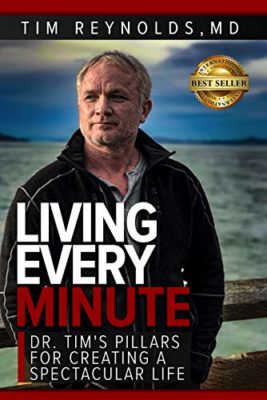
Living Every Minute: Dr. Tim’s Pillars for Creating a Spectacular Life
In my business, I’m in love with waking up every morning and going, “What problems have we got to solve today? What issues are they? What trainings are we going to do? Do we have some business goals?” Yes, but that’s not the important part. You can’t fall in love with that because it may or may not happen. What will happen is every day, we get to do this thing that we get to do. If you fall in love with that, fall in love with the right thing, you still set goals, but they have a different reason. They’d have a different thing.
You did an amazing job of setting the theory, setting some frameworks, but you also have some tools for execution. Obviously, you have the book, workbooks, some material online, then you have Gladiator, and you have some other things that you’re doing. Maybe speak to those as we conclude.
We’re putting this all together. We have the Living Every Minute book. We have Living Every Minute – Workbook. Those are available LivingEveryMinute.com or on Amazon. It’s also on Audible. I finished it. It’s weird listening to yourself read a book.
It’s awesome. You make these little side comments and interviews.
We did the Audible. There’s that, the workbook. We have the journal planner. I talked about that. It’s on LivingEveryMinute.com, all this. Our blog is there as well. We started a course. These didn’t have anything to do with each other. This was happening. I started this course called Gladiator. It’s called Reclaim Your Gladiator. The reason it’s called Reclaim Your Gladiator is because it’s a men’s course and men are already gladiators, they just forgot. For three days, I remind them of who they are, what they were born to do, and what they’re here for. It came with this whole idea of toxic masculinity, this whole idea, this bullshit concept, that masculinity is toxic.
Masculinity is protective and helpful and all of the good things. What you see negative that men do is not masculinity. That’s called being an asshole. The sideways hat and the big truck are not masculinity. Don’t mistake the two things. That’s what I literally said in the back room and designed the course. Everything from Special Forces days to Tony, to Keith, everybody I’ve learned from and said, “How can we create this into a course?” We started running this gladiator course and it’s been amazing.
We’ve put 100 men through it. We only do 12 at a time. We only do it twice a year. It’s on my ranch in Texas. Three days. There’s a physical component to it, but it’s not about physical. It’s about mental spiritual. What happens in the classroom and in the conversations is way more important than the physical part. I knew for my Special Forces days, and you did a thing, so you appreciate this, men don’t open up without a physical component. You get them to be physical, get them tired. Now I can get them to open up and I can teach them. That’s why there’s a physical component, it’s part of it. It’s become awesome. That’s at the same website, there are videos and stuff. I did that for a few years.
Everybody said, “You need a woman’s course.” I said, “I don’t know how to do a women’s course. I was in Special Forces. There were no women.” No offense to women, but all my companies are run by women, but I don’t know how to train women. It’s not my thing. I have my wife do it. She’s like, “I’m not doing it. You’re the trainer guy.” We kept going back and forth. Finally, I said, “I’ll do it.” I sat for an entire summer and I planned out what would a woman’s course be. I want them to be just as bad-ass as Gladiators, but not turn them into men.
Part of our problem in our society is we’ve mistaken equality of pay and how we’re treated for sameness. We’re not the same. There are men and women. There’s feminine energy, masculine energy. They’re not the same. That has nothing to do with equality. Sometimes we confuse the two things. Inequality means sameness. I didn’t want to make them the same. I debated how to do it. I took the whole summer. The whole name Valkyrie, if you know what Valkyrie is, they come from the Viking days of Nordic people. I originally named the course, Ninja Princess Warrior.
I was told by the other women, “That would not be the name of the course. The name of the course would be Valkyrie.” We’ve done two. We got two coming up. It blew me away. It ended up being cooler than Gladiator. Women have this unique problem that men don’t have, that we don’t think about. Women have to do everything a man has to do. I’m thinking of a single mom. Go to work, provide, be all of the things that she has to be and then go in and take a shower, put on high heels and a dress and become super feminine. We don’t have to make that choice.
Part of our problem in our society is we've mistaken equality of pay and equality of how we're treated for sameness. Click To TweetWe just stay in that one state all the time. They have to do all the thing we have to do and then also be super feminine. The whole course is going back and forth to a masculine, feminine energy. Tony says, “How do you make your dog, your dog? You give it a name and you teach it to come on your call.” I said, “Which part of your personality do you need to teach?” You don’t talk to your child the same way you talk to your colleague, the same way you talk to your buddy at the bar.
You have to know which dog to bring to which bite. It’s about that. We ended up with Gladiator and Valkyrie and then that led into a couple’s courses. We have a couple of courses that we do. We talked about these, because it’s not Gladiator. It’s not a physical course, but it’s about strengthening people’s marriages. The 30-second make-out session, a bunch of other things we go into.
A few years into it, the Gladiators came to me and said, “What about advance? What’s the next thing? We want to advance Gladiators.” We’ve been 60 men or so at that time. I said, “You be careful what you ask for.” They’re like, “No, we want it.” I created advanced, which we call Ragtag Bastards. I created the Ragtag Bastards course, but that’s for people who’ve already done the first course. We hold that once a year. Now they’re talking to me about that Valkyrie.
We’ll see how that goes. One thing’s leading to another. Rather than me pushing what’s happening, I’m feeling the pull of what’s happening now. It’s fun. I like it. We have those tools that are available. We’re also going to do our first ever Living Every Minute Summit. We’re going to take probably three days and teach everything in the book over a three-day process and have a summit where people can come and learn.
Talk about the website.
LivingEveryMinute.com is where all this is housed. It’s where the events are. It’s where the book is. You can get books, workbooks, the planner. Everything’s on that site. That’s where we’ll announce when we go inside to do the summit where, and when that’s going to be. We’re talking about doing a podcast, we love the idea of doing it. We just haven’t got to that point yet, but eventually, we’ll do that. We’ll put all that on there as well.
Tim, it’s been awesome.
Let me put a plugin for you. I’ve been watching you over the last few years. As I’ve known you and watch you move from one office to the other, watch what you’re doing and your personal growth and path. I’ve been watching from a distance and through John and see what’s going on. I’m proud of where you are headed. This is awesome. Good job.
That means a lot. We’ve discovered similar principles. We don’t have to reinvent the wheel. That’s what we have in common. The wheel has been invented. We just couldn’t figure it out and execute.

Fulfilling Life: Masculinity is protective and helpful and all of the good things. What you see negative that men do is not masculinity. That’s just called being an asshole.
Take what other people have taught and just execute it.
It’s a game where it’s not all success. You hit the nail on the head, 80% failure, 20% success. That 20%, it makes it like that. It’s totally worth all the 80% and maybe even a little bit more, honestly. I don’t think we value the success if we don’t get punched in the face every now and then.
If you are always successful, you wouldn’t know any different.
Tim, you’re awesome. Thank you. Everyone, thank you for reading. See you next time.
Important Links:
- YouTube – The Wealth Standard Podcast
- HealthCARE Express
- Living Every Minute
- Audible – Living Every Minute
- LivingEveryMinute.com
- The Traveler’s Gift
- Living Every Minute – Workbook
About Dr. Tim Reynolds
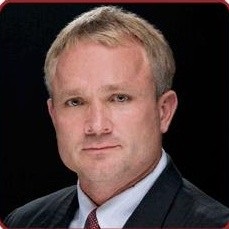 Dr. Timothy Reynolds is the founder of Dr. Tim international Inc., a company he established in 2009 to allow him to share his passion for Living Every Minute™ with others. He dedicates countless hours each week to helping others transform their lives through mentoring, life building, inspirational talks, and writing his motivational blogs.
Dr. Timothy Reynolds is the founder of Dr. Tim international Inc., a company he established in 2009 to allow him to share his passion for Living Every Minute™ with others. He dedicates countless hours each week to helping others transform their lives through mentoring, life building, inspirational talks, and writing his motivational blogs.
Dr. Tim was the first member of his family to graduate high school. He joined the military shortly after graduation and graduated from the Special Forces Q-course in July of 1982. He served as a Green Beret on an A-Team as the Battalion medic and eventually as a Special Forces Battalion Surgeon for the 19th Special Forces Group (Airborne). He served both enlisted and as an officer for 17 years.
After getting out of the military, Dr. Tim graduated college with honors. His passion for helping people inspired him to become a medical doctor, and in 1993 he graduated Summa Cum Laude with an MD degree from the University of Utah. He completed his Emergency Medicine residency at Texas A&M Scott and White in 1996 and is board certified in emergency medicine.
Dr. Tim is the managing partner for HealthCARE Express, a group of urgent care clinics rapidly expanding across the United States. Prior to starting HealthCARE Express in 2006, Dr. Tim held numerous positions in the medical field, including: medical director of the Wadley Regional Medical Center Emergency Department and level II trauma center; president of E-Med Services, LLP and of E-Med Billing Solutions, LLP; associate clinical professor for the Area Health Education Center at the University of Arkansas; and founding member of the Greater People’s Clinic of Texarkana Board of Directors.
Dr. Tim is also an entrepreneur and successful businessman. He is currently the chief executive officer of TL Reynolds Properties, LLP, a real estate investment company; and he is a managing partner of JJET Developments Ltd., a real estate development company.
Dr. Tim enjoys spending time on his Ranch in Atlanta, Texas, where he lives with his wife, Pam, and their five amazing children. He holds a black belt in Tae Kwon Do, is a SCUBA rescue diver, and a pilot. He also enjoys body building, golf, and hiking.
Love the show? Subscribe, rate, review, and share!



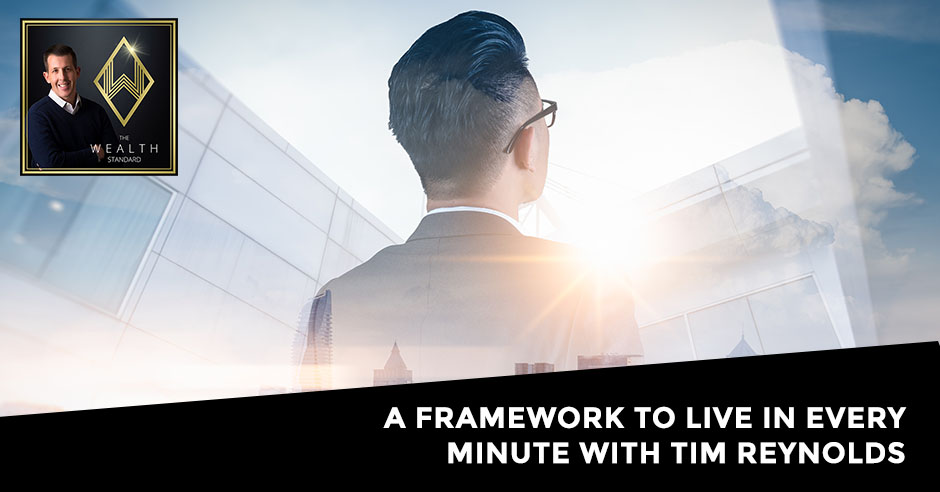


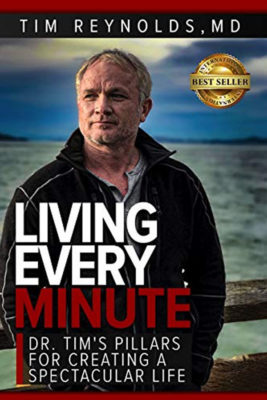
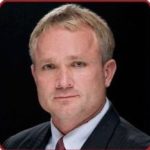 Dr. Tim Reynolds is the President and CEO of Dr. Tim, International, a company he founded in 2009 to allow him to share his passion for Living Every Minute with others.
Dr. Tim Reynolds is the President and CEO of Dr. Tim, International, a company he founded in 2009 to allow him to share his passion for Living Every Minute with others.
